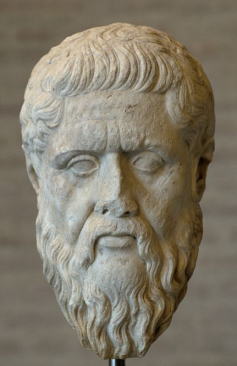The Greek Philosopher Plato
By Mey Elghusein
Published on September 19, 2015

The Greek philosopher Plato (428-7-348-7) B.C., is deeply involved in humanity; substantial parts of his book The Republic give an outline of the theoretical basis he considers necessary for a happy human community –a Utopia.
Because we admire and revere Plato, it is more appropriate to deal with those ideas of his on which we agree with him, and leave for the second part those ideas that we deplore. In his Republic dialogue, Plato considers morals, education, philosophy and religion, society and politics.
Plato’s ideas about morals, education, philosophy, and religion are lofty, noble and elating, and can surely lead to a happy and fair society.
Plato considers morals and ethics fundamental for human happiness, this doctrine called “eudemonism” holds that right action or reasons are moral obligations for individual and social conduct.
On the individual level, one is supposed to strike a balance between physical desire, ambition, and intellect. On the social level, everyone is encouraged to mind their own business.
Most impressive about Plato’s thoughts on education is that boys must be taught to consider slavery worse than death. His request from the teacher: “ To turn the mind’s eye so that it can see for itself“ is very wise.
Plato’s idea about religion is reassuring for the human soul because he considers our existence on earth a shadow of our eternal existence.
Plato’s Utopia becomes infinitely less desirable than our own world when we find ourselves appalled by his ideas on the relationship between man and woman: He wants to abolish the family, to reduce the relationship between the sexes to mere moments of physical pleasure arranged by the state with the view to produce children.
Although it is quite natural in every society that “classes” occur due to the different intelligence and potentials in humans, Plato’s idea of a deliberate class-building policy is unnatural and thus to be rejected.
Plato wants deformed children and children of inferior parents to be put away in some mysterious unknown places; this is the point were we say NO to our great philosopher.
The Author

Mey Elghusein holds a BA in English language and literature.
Article picture: Plato. Source: Wikipedia


